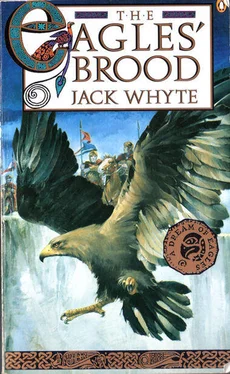I thanked him for his assistance and begged his pardon, pleading a sudden nausea from something I had eaten, and left him standing there, gazing after me in perplexity, as I sought the cloaking anonymity of the darkness beyond the campfires.
The night was cool but pleasant, and I walked quickly once my eyes had adjusted to the dark, pacing with great strides that stretched my legs and made me concentrate on watching where I trod while I allowed the tumultuous thoughts inside my head to riot, swirling and tumbling as they willed, seeking their own level in the way of floodwaters, roiling and turbulent, clashing in violence and only slowly, gradually, inevitably lessening and gentling to a point where I could begin to make some order from their chaos. I recalled the tale my father told, and the tragic incompleteness of his knowledge: his lifelong ignorance that his illicit, nocturnal communion with the "dream- woman" who had used him and almost repaid him with death had resulted in a son who was the image of his unknown sire, a soldier—as witnessed by his place at Vortigern's side—whose very bearing would, I suspected, have brought a swell of pride into my father's—his own father's—chest.
As these thoughts were passing through my mind, however, I found time to wonder at my own reactions to this Ambrose, telling myself ruefully that I had no reason for endowing him with the attributes that sprang so readily into my imagination. I knew nothing of him, beyond our one all- too-brief encounter, and I well knew the folly of placing too much trust, too soon, in any man. And yet I also knew I could trust my own instinctive assessment of men, even complete strangers. My life had depended on that ability too many times in the past for me to doubt it now. Ambrose, I believed, would be all that he appeared to be, and I felt sure, deeply and strongly within myself, that the day would come when he and I would be brothers in every sense of the word.
By the time I stopped walking, I had passed far beyond the confines of the camp into an open meadow, and I stood there for a long time, staring up at the myriad swirling, spiralling stars in the cloudless sky, allowing my mind to empty itself, and then recalling how, one night in the time of my grandfather's father, one of these same stars had crashed to earth, bringing the Skystone and Excalibur into the world of men.
He called himself Ambrose, Ambrose Ambrosianus, proud of his Roman blood, but he was in error and in ignorance. His real name was Britannicus, Ambrose Britannicus, son of Picus Britannicus, son of Caius Britannicus, latest in a long line of Eagles. He was, or ought to be, as much as I, a Prince of Camulod, equal with me and with Uther. My body stirred with goose-flesh. Perhaps here was the man to wield Excalibur! Perhaps this was the one whom, according to Uncle Varrus, I would know above and among all others— the Champion whose coming had been dreamed. He bore the blood of Caius Britannicus; perhaps he had the vision, too.
Fighting to contain my excitement, I swung round and gazed back towards the lights of the campfires, too far away to see who moved there, but thrilled to my bones with the knowledge that one of them, one of those moving forms, was my own brother, Ambrose Britannicus. The Great Debate, I realized gradually, had become almost insignificant to me now, usurped by the most urgent imperative in my life: the need to sequester, to inform, to embrace and to come to know my sibling. Calm once more, my heartbeat safely harnessed, I set out back to the encampment to find him and draw him aside to where I could tell him all that he must know.
On my return, however, Ambrose was nowhere to be found. Vortigern's camp was filled with the noises of comradeship and celebration, but my brother sat in none of the gathered groups. Eventually, after my second fruitless circuit of the fires, I approached the central gathering again, the noisy, relaxed group of officers and clerics lounging informally among a cluster of large fires in the space in front of Vortigern's own large tent. Few of them paid any attention to my arrival and I made my way directly to the group that held Vortigern himself, with Lucanus, Pellus, Cyrus Appius, Jacob of Lindum and several others unknown to me. The sight of Jacob gave me pause and I changed direction to avoid being seen by him, moving around the group until I stood behind him, out of the direct light of the fire. He, like Ambrose, had seen me only in my armour, anonymous beneath my heavy helmet. The sight of my yellow hair and my uncanny resemblance to his "nephew" might shock him and give rise prematurely to the kind of speculation I knew I had to avoid until I had had occasion to speak to Ambrose.
Pellus had been saying something as I approached, and now Jacob himself was answering, his voice urgent as he sought to acknowledge and yet refute whatever it was that Pellus had been saying. Every eye in the group, including Vortigern's, was on Jacob, and as I scanned the faces of those seated opposite, failing to find Ambrose among them, I was listening with half an ear to what was being said.
".. .the same at first, when I first heard of it. My reaction was exactly the same as yours. Foolish, I thought. Stupid and dangerous and irresponsible. Those were my first responses. But that was more than ten years ago, before I met Vortigern, and before I met the people he'd brought in. Since then I've changed my mind. I know them now, all of them, and I can accept what's happening... I'm not completely comfortable with it, even now, I must admit, but in comparison with the alternative, there's not much I could say with confidence to prove he's wrong. I mean-"
"But he has to be wrong!" This was Pellus again, turning to Vortigern even as he spoke. "Will you not admit, King Vortigern, there's room for grievous error in your thinking? These are barbarians, when all's said and done.. .Outlanders just like the people against whom, through them, you seek protection. Their background, their mores, their very way of thinking is alien to our own way of life."
Vortigern was staring directly at Pellus, the hint of a frown marring his handsome face, and knowing now what they were discussing, I sat down unobtrusively on the end of a log, safely obscured from the general view by the broad back of the man in front of me. Earlier in the day I had clearly recalled my father talking of King Vortigern: of how he was tempting fate by allowing foreign mercenaries to settle in his lands, paying them for protection with holdings of their own and thereby granting them a foothold and a promised future in Britain. Acceptable enough, he had pointed out, if only one could somehow guarantee that these same barbarians would not wish, at some time in the future, to share their new-found freedom, wealth and bounty with their friends and families, relatives and neighbours still struggling for survival beyond the sea. Someday, my father had foretold, these newcomers would arise in power and stretch themselves, claiming the land as theirs, and in so doing dispossess their hosts.
Silently, with the others, I watched Vortigern's face and waited for him to speak, admiring the effort with which he restrained his understandable wish to savage Pellus. Finally he cleared his throat and spoke, his voice clear, almost a monotone in its lack of emphasis, the hint of a gracious smile quirking his lips.
"There may indeed be room for error in my thinking, Master Pellus, but Jacob, here, spoke of alternative considerations and I would ask you to consider the alternative to my having any thoughts at all in this matter..." He allowed that to hang there, vibrating in the silence for a moment, before he continued, "Would it be better not to think at all, and therefore to do nothing? To wait, and sit back, and see my lands and my people savaged and laid waste by an endless plague of raiders from all directions?" He shook his head, still calm. "No. I can assure you, that is what Would have happened before now—years ago—had I done nothing. Because we, my people and I by ourselves, were powerless in the face of the onslaught that threatened us even before the legions left."
Читать дальше









